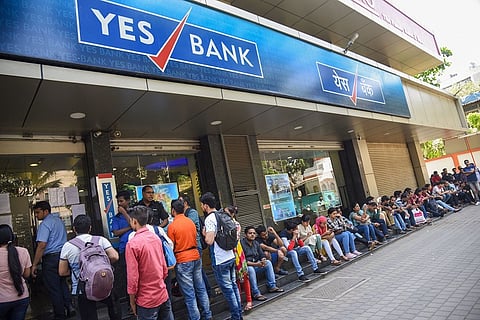

People’s confidence in the banking system is at an all-time low in India. While the PMC Bank crisis rattled many across Maharashtra, Yes Bank being put under a moratorium has made matters worse. Several thousands of Yes Bank customers were left in the lurch after the bank was placed under a moratorium and a withdrawal limit of Rs 50,000 per account till April 3 was imposed. Despite the limit, debit cards, online transactions, withdrawals were not working all through Friday and Saturday, causing immense inconvenience to all account holders of the bank. Friday and Saturday saw scores of people line up at the bank trying to withdraw money.
For the longest time, a savings account has been seen as the safest place to keep your money, especially after demonetisation showed us that keeping money stashed at home may not be the safest option.
But what happens when a crisis like PMC Bank of Yes Bank hits? What are they ways in which you and I can keep our money safe?
It's not just your SIP or mutual funds, it's always better to have more than one bank account. If you have an account in one bank as the salary account, you could park your savings in a larger, preferably nationalised bank. Public sector banks, such as SBI, are safer and more stable than smaller private banks. You could opt for a fixed deposit or savings scheme in another bank.
This way, if your bank freezes your money for any reason, you will have savings, or some money parked in another account.
Several financial experts saw the Yes Bank crisis coming. In fact, one of the reasons why a moratorium was placed was because many large accounts realised that the financial position of the bank was deteriorating and hence started pulling their deposits out.
So always track your bank. If you hear that there have been exits from the top management, or the bank is in the news because of its financial health, or if the share of the bank on the stock market tanks, these are signs of trouble at the bank.
Banks report their earnings every quarter. Pay attention to the losses they’re clocking. Pay attention to the large corporates your bank is lending to and what the extent of its bad loans are. It is also important to pay attention to what the management and financial experts are saying about the bank’s finances.
Even if a scam is unearthed, or the RBI slaps fines against the bank for unlawful activities or hiding his financial health, that is a red flag right there.
No form of saving or investment is completely risk free. But how you choose to hedge your risk is what is important.
Some banks offer high interest rates on deposits. For example, while SBI’s interest rates can go up to Rs 6.8%, a smaller bank like IDFC offers interest rates up to 8.50%. In fact, Yes Bank also offered interest rates of up to 8% on its fixed deposits.
But always remember, higher returns always come with higher risks. So, before you open any savings scheme with a bank, understand its financial health and how stable it is.
Every depositor is insured by the Deposit Insurance and Credit Guarantee Corporation (DICGC). As per RBI guidelines, deposits with all commercial banks and cooperative banks are insured under the DICGC. However, they were insured only upto Rs 1 lakh, which many were upset with. As part of Budget 2020, Finance Minister Nirmala Sitharaman announced that the depositor’s insurance in banks is being increased five-fold to Rs 5 lakh.